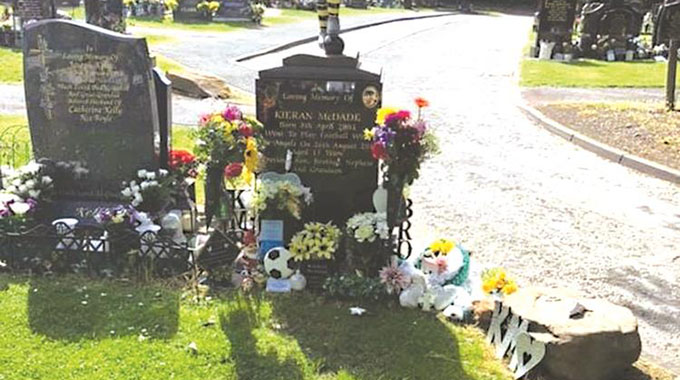Twenty good years in the valley of life, twenty bad years in the shadow of death

Sharuko On Saturday
WHEN, the body count was finally over, it all came down to a dreaded number, associated with tragedy, the world over.
THIRTEEN!
The number of fans the Warriors lost, in that cathedral of mayhem, the number of people the country lost, in that sporting disaster.
Mothers of someone, fathers of someone, brothers of someone, sisters of someone.
Each of them now a lifeless symbol of tragedy, spoken of in the past tense, where there was “is’’ now replaced by “was’’ and “were’’.
Where there was life, now there was death, where there was light, now there was darkness, laughter replaced by horror.
The tears, the fears, the dead, the pain, the sorrow, the despair, the panic.
Thousands of tortured souls, all of us cursing our fate, living this nightmare, our giant arena having long been transformed from the beautiful garden, where we explored our sporting fantasies, into this cage of death.
From paradise, to hell, in just an instant.
How times change.
Eight years earlier, we had celebrated how this very stadium had turned into a slaughter chamber for these very opponents, Bafana Bafana, in a four-goal demolition of the boys from across the Limpopo.
“He is too beautiful to play football,’’ the late Willard Mashinkila-Khumalo had told us, in the frenzy of joy that followed Bafana Bafana’s humiliating defeat.
The jibe was aimed at Doctor Khumalo, the man they had said would teach us a proper Shoe-Shine piano football lesson.
Instead, the real lesson was provided by our boys, Peter Ndlovu producing an outrageous piece of skill, to slalom through the bemused visitors’ defence and then, finishing with aplomb, for a special individual goal.
Somehow, fate had ruled the same Bafana Bafana should come and inflict the damage, through Delron Buckley’s two goals in that ill-fated World Cup qualifier on July 9, 2000, and create the unfortunate chain of events, which eventually resulted in the tragedy.
Two days ago, the clock marked 20 years, after that tragedy and, once again, provided us with a time for both reflection, and remembrance, of those we lost that day.
And, for me, more than chronicling our finest hours, like reaching the gates of the Promised Land of the World Cup in Yaounde in 1993, keeping alive the memory of those who lost that day has been the grand mission of my career.
More than being there, to capture the sights and sounds of the moment Dynamos came within 90 minutes of being champions of Africa in 1998, honouring the memory of those who perished that day, has been the biggest assignment of my career.
More than covering the first AFCON finals battle for the Warriors, in the Tunisian city of S’fax in 2004, making sure the memory of these fallen heroes isn’t blown away, by the passage of time, has been the enduring mission of my career.
More than covering the first Nations Cup finals win for the Warriors, against Algeria in 2004, ensuring these fallen heroes remain a big part of our football adventure, has been the proudest assignment of my career.
I was there in Algiers, 25 years ago, when Blackpool came desperately close to reaching the final of the Cup Winners Cup, as a Zimbabwean football club finally came of age on the continent.
I was there at the National Sports Stadium when Vitalis Takawira scored a hat-trick, a quarter-of-century ago, in a four-goal demolition of the Indomitable Lions which, in a way, provided proof they had played dirty to beat us in Yaounde two years earlier.
I was there in Abidjan, when they head-butted Memory Mucherahowa into unconsciousness, and poor Issa Hayatou looked elsewhere, as part of the dark arts needed to finally defeat the Glamour Boys spirits in their brave quest to be champions of Africa in 1998.
I was there in Birmingham, sitting in a Nando’s outlet with Peter Ndlovu and his manager, Winston Makamure, discussing the end of the Flying Elephant’s romance with English football.
Discussing the highs of being the first African player to feature in the English Premiership, and the only one from this continent to score a hattrick, against Liverpool, at their Anfield fortress, in the Reds’ proud history.
But, nothing, in those assignments, provides the badge of honour I have carried on my chest, like the crusade to try and ensure those fallen heroes are not forgotten.
For me, this has been the defining mission of my journalism career.
TWENTY YEARS IN THE VALLEY OF LIFE, TWENTY YEARS IN THE SHADOW OF DEATH
It was the explosion of that tragedy which influenced me to start this weekly blog in this newspaper, under the identity, “The Godfather’s Postcards From The Terraces”, without the attachment of my name.
“Hi, folks, welcome to this brand new column that we hope will play its part in the development of soccer in this football-crazy country,’’ ran the opening paragraph on Saturday, July 22, 2000.
“It’s a weekly column, coming out every Saturday, and will look at a variety of issues affecting our game, their implications and its future.
“It’s a no-holds-barred column that will salute the heroes and blast the villains, toast milestone victories and mourn crashing defeats and look for the story behind the stories.
“Of course, naturally, there can’t be a better starting point for the column than the tragedy at the National Sports Stadium on July 9 that cost 13 innocent lives.’’
If anyone had gambled that, 20 years later, this blog would still be appearing, in this newspaper, on this very page, the chances of that coming true were possibly as virtually impossible as expecting to extract milk from a football.
Understandably, the disaster, the number of those we lost, the weight of the trauma, which the people they left behind continue to be burdened with, the scores who were injured, their lives changed forever, has been a big part of the life and times of this blog.
And, this has made me search into the history books, getting to learn about how a fellow writer predicted the Titanic would sink, 13 years before it was even built, forcing me to keep asking myself if we ended up running into some dark phase, of this brutal number, when that disaster struck?
Along the way, my mind has drifted to Davide Astori, the much-loved captain of Fiorentina whose sudden death, in his hotel room, just hours before a Serie A match against Cagliari, shook world football.
And, the questions have kept coming — is there any link, whatsoever, between this tragedy and the fact that Astori wore the number 13 jersey, at the time of his death in March, two years ago?
Why, I keep asking myself, was Astori, at the time of his death, aged 31, the very numbers, which if you switch around, gives you the dreaded number 13?
Both Fiorentina and Cagliari have since retired their number 13 jerseys, in honour of the player.
You can call me whatever you want, from bizarre to insane, from ridiculous to foolish, from wild to crazy, a man possibly drifting into madness but, I guess, that’s what comes with what is called post-traumatic stress disorder.
It’s a terrible condition to have, and many of those who could be laughing at me right now, describing me as a madman still consumed by the horror that happened 20 years ago, might be the ones seriously affected by PTSD.
The only problem is that they don’t know it and, by drinking alcohol to excess, they think it’s just a way of life, by having a shot fuse, which makes them explode at the slightest form of irritation, they think it’s all normal.
What they don’t know is that, in reality, just like me, just like those who lost their loved ones in that disaster and the scores who were injured, we all still carry a heavy burden from the nightmare of the tragic events of that afternoon.
At least, in my madness, or whatever you call it, I have refused to live in denial and, instead, I have been on a journey try to find an explanation, to understand why it had to happen to us, to honour the memory of those we lost and to try and ensure that, no matter what happens, our football will never forget them.
That’s why I keep asking myself questions which probably can never be answered.
Why, does this number 13 represent so much sadness, why is it such a symbol of depression, why is it such a representative of darkness, even from the time Judas Iscariot betrayed our Lord and Saviour Jesus Christ?
Why, for instance, is it the number you get, when you add up the number of the letters of the names of some of the worst serial killers to have roamed our world?
Albert De Salvo, known as the Boston Strangler, who confessed to the murder of 13 women in the United States, Charles Manson, known as the Milwaukee Cannibal, who molested, murdered and dismembered, at least, 17 men and boys, in a killing rampage in America.
Theodore Bundy, the American serial killer who kidnapped, raped and murdered, at least, 30 women, Jeffrey Dahmer, the ruthless cult-leader whose followers killed numerous people in the United States.
Even Jack the Ripper also has 13 letters to it.
Dutch football legend, Johan Neeskens and his crew of Total Football were good enough to make the 1974 and 1978 World Cup finals but, on both occasions, they ended on the losing side, beaten by the hosts.
The Dutch lost again, in the final of the World Cup, in 2010.
Neeskens used the jersey number 13, in both finals, in 1974 and 1978 or, maybe, it’s something to do with their name and colour of jerseys — Holland Orange — you add the letters and you get the number 13.
FROM KIERAN MCDADE TO JAMES RANSON, SOMETHING JUST DOESN’T FEEL RIGHT
Scottish schoolboy, Kieran McDade, was 13 when he collapsed and died while training with his local football team Dunbeth, just four years ago on August 18.
His sudden death had such a profound impact on his country, and the club he supported, Celtic, but what happened next is what I still can’t understand.
In Celtic’s next league match, against Aberdeen, the club’s players and fans paid a tribute to the boy they had lost and, when Leigh Griffith scored for the Glasgow giants, he held up a jersey, with the number 13, in honour of Kieran.
Somehow, that goal, was scored in the 13th minute.
On January 2, 1971, during the Old Firm showdown between Celtic and Rangers at Ibrox, 66 people, including five schoolmates from the town of Markinch in Fife, were killed, while more than 200 were injured.
The stampede happened at an exit, at the stadium, called Stairway 13.
Kenny Dalglish, then a Celtic player, was in the stands at the time of that disaster and, by the end of the season in May 1972, he had scored 29 goals to help the club win their seventh consecutive league title.
Thirteen years after that triumph, Dalglish was part of the Liverpool team, at Heysel Stadium in Brussels, Belgium, when 39 fans, mostly Juventus and Italian supporters, were killed on May 29, 1985.
Maybe, it is what it is, and let’s just leave our adapted version of this R Kelly hit song, “I wish,’’ to close the conversation.
“Voices in our heads are telling us to come to church
Said the Lord is the only way for us to stop the hurt
Dreaming of windows black tinted like a hearse
When waking up to life sometimes seems worst
And all we ever wanted was to be a better men
And we try to keep it real with our lost colleagues now
For us to still remain in the world we don’t understand
How did we come to be the ones who survived in that den?
“And now we hear our cries, because the radio is banging
Oh, we can’t believe our ears
And, what everybody’s saying
Well, we’ll tell you, folks don’t know the half
We would give it all up, just to take one ride
“How we used to street perform on Fridays
(With you)
How we used to go to church on Easter Sundays
(With you)
Standing here throwing them songs at us
Somebody pray for us
“We wish that we could hold you now
We wish that we could touch you now
We wish that we could talk to you
Be with you somehow
We know you’re in a better place
Even though we can’t see your faces
We know you’re smiling down on us
Saying everything’s okay.’’
To God Be The Glory!
Peace to the GEPA Chief, the Big Fish, George Norton and all the Chakariboys in the struggle.
Come on United!!!!!!!!!!!!!!!!!!!!!!!!!
Bruno, Bruno, Bruno, Bruno, Bruno, Bruno!
Text Feedback — 0772545199
WhatsApp — 0772545199
Email — [email protected], [email protected]
You can also interact with me on Twitter — @Chakariboy, Facebook, Instagram — sharukor and every Wednesday night, at 9.45pm, when I join the legendary Charles “CNN’’ Mabika and producer Craig “Master Craig’’ Katsande on the ZBC television magazine programme, “Game Plan”











Comments